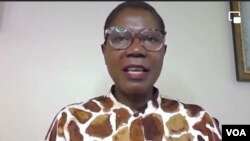Sharon Njobo, former senior business reporter of the state-controlled Zimbabwe Inter-Africa News Agency (ZIANA), was forced to leave her job in the troubled southern African nation when she wrote a report on President Robert Mugabe’s failure to secure a multi-million-dollar fuel supply deal with the government of Kuwait.
Njobo travelled to Kuwait in 2000 as part of a presidential news crew. Mugabe was expected to seal the proposed deal at a time Zimbabwe was facing serious fuel shortages. Details of the botched deal penned by Njobo took the government by surprise, resulting in the state withholding funding for ZIANA.
Njobo, who was harassed by state security agents, left the country for USA where she stayed for a few years before leaving for Canada. She now works as a manager of a development agency and uses social media to highlight issues affecting women, especially Zimbabweans living in different countries.
Njobo says there is no press freedom in Zimbabwe and therefore local journalists should be innovative in order to highlight issues affecting citizens. She also believes that government should work well with journalists in order to create a conductive media environment. She speaks with VOA Zimbabwe’s Gibbs Dube about this and other issues.
Gibbs Dube (GD): Describe your experience as a journalist in Zimbabwe. What difficulties did your face?
Sharon Njobo (SN): One of my most vivid memories of working as a journalist in Zimbabwe is what ultimately led to my leaving the organization that I was working for. I remember that I worked as a senior business reporter and part of my responsibilities included travelling on state visits with His Excellency at the time Robert Mugabe and I had traveled with him on a trip to Kuwait where Zimbabwe was going to negotiate for a credit facility to procure fuel. That was unsuccessful. So, I wrote about that and obviously the government was not pleased about it and they made life difficult for the entire organization of ZIANA and it became uncomfortable for me and my colleagues at that time and I took it upon myself to leave the organization so that the government could release funding because they were actually holding onto funding for ZIANA because ZIANA was writing stories that did not align with the government mandate.
GD: What other difficulties did you face as a ZIANA reporter?
SN: There is that harassment that you experience as a woman in a field that is predominantly perceived to be for men and also some of the challenges that we experienced at ZIANA was inadequate funding, which now when I reflect was not just because there were challenges with the budget or fiscus but it was probably intentional on government’s part to keep us underfunded and as well while we did not have any specific instruction from our editorial leadership to report in a particular way you would from time to time especially when you were working closely with the president’s office you would get the reminders from time to time that you needed to be careful about how you reported about government.
GD: What’s the current state of press freedom in Zimbabwe?
SN: I’m in a number of groups, journalism groups, with colleagues who are still back home in Zimbabwe and I would say the space has shrunk even further for journalists in Zimbabwe. In 2017 with the new regime that came in there was this expectation that there would be press freedom but we don’t see that and one of the factors that I observed to particularly challenging for journalists in Zimbabwe is the economic situation where there is so much poverty and this is compromising as well how journalists can report on some issues and it makes them vulnerable. Their intergrity is compromised because sometimes they have to choose between bread and butter, literally and journalism ethics. So, I find that shrinks the space even further for journalists in Zimbabwe.
GD: Are you working as a journalist? What are you doing to ensure fair coverage in your country?
SN: I’m not working as a journalist currently but with the growth that we are seeing in social media, journalism is different now and I/m very big on social media. I have a Facebook group where I share a lot of information about Zimbabwe with women who live in Canada. Part of the mission with this Facebook group is to get women engaged in economic, social and political issues not only in Zimbabwe, just to create space in which women are comfortable and they are also appreciative of the diversity of views trying to cultivate a democratic space. So, you can call that Facebook page a newspaper.
GD: What’s your advice to journalists in Zimbabwe? What’s your advice as well to the government?
SN: My advice to journalists is to be tactful, to be smart, to also see how they utilize social media and not to entirely depend on the mainstream newspapers, radio and outlets like that. So, being creative on how they utilize social media because at the end of the day is what you want to get out there it information. What we have seen with social media is that you cannot suppress the voice of the people. What will be helpful to the government will be as truthful and as accurate and as quick as possible because over and over again we are finding that people will eventually get to know the truth and government as well can use social media effectively, can work effectively with journalists to communicate their agenda.




